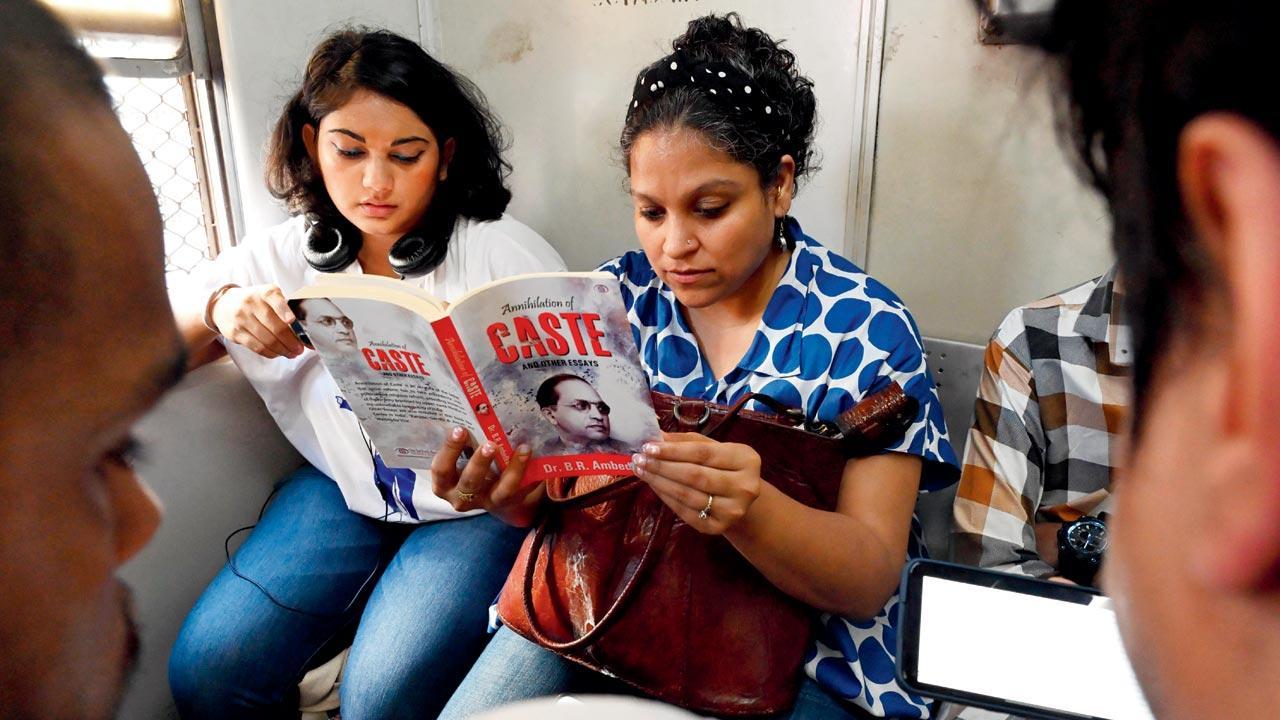Hosted on local trains, this distinctive reading circle is a small step toward building a caste-free country

The Mumbai local train, a symbol of the city’s diversity and hustle, becomes a fitting backdrop for reading literature that challenges casteist ideologies
Passionate individuals, led by illustrator and design researcher Bao, whose work intersects caste, gender, and ecology, have formed an anti-caste reading circle. It aims to challenge the deeply entrenched caste system through collective learning. Their chosen setting? The very public, accessible, and humble Mumbai local trains.
ADVERTISEMENT
Inspired by the fictitious Begumpur, a society envisioned by Guru Ravidas’ (15th century poet-saint) where people live in harmony without discrimination, this journey is called Begampur Local.
“Given the current political environment of the city,” Bao explains, “seeking permission from the police or authorities for access to public spaces or parks to read anti-caste literature is tedious and difficult. Local trains are a safe space to read and invite fellow passengers into the discussions. After all, the idea behind this is not just about literature—it’s about bringing anti-caste sensitivities into the everyday lives of citizens.”
Last Sunday, we ventured out of our comfort zones and joined the group on the Western Line, starting at Churchgate. We met outside Government Law College, boarded the train to Borivli, taking turns to read aloud passages from Dr Babasaheb Ambedkar’s Annihilation of Caste and discussing them. Previously, the group had journeyed from CST to Vashi on the Harbour Line on September 2.
The circle has already garnered attention, with new members joining each session and reading three sections—this week was a continuation of the text of Annihilation of Caste. It was a festive Sunday, so the turnout wasn’t too great, but we did have a film director, a student, and a marketing professional as companions. Passengers around looked on inquisitively. We were drawn towards the text, a ground-breaking critique of the caste system, offering a powerful call for social justice and equality. For instance, we learnt from the reading that the term Hindu was introduced by the Mahomedans to differentiate the local population from themselves. The name does not appear in any Sanskrit texts before the Mahomedan invasion. It says, Hindu society as such does not exist. It is only a collection of castes.
Focusing on the power of public engagement, the circle operates on a simple premise: gather, read aloud, and discuss. Each group member brings their copy of the reading material—physical or digital—and takes turns reading aloud. Afterwards, a discussion ensures participants engage with the text and each other’s perspectives. The group has clear guidelines that foster respectful and compassionate engagement. “It’s not just about listening, but about actively participating in a conversation that has too often been ignored or suppressed. Participants are encouraged to join with an open mind and form anti-caste beliefs,” says Bao.
One of the group’s fundamental principles is flexibility. Members can board from any station and leave whenever they wish. We alighted midway, too, no questions asked. This open structure ensures that the group remains accessible despite the ever-changing schedules of mega block rail maintenance on Sundays. A WhatsApp link is sent to join a group where all meeting information is shared.
Bao also emphasised the importance of making this a space for all. “The curiosity and participation of children is encouraged,” Bao explained, noting that challenging the caste system is an intergenerational effort. ”Members of the Dalit, Bahujan, and Adivasi communities are not expected to bear the burden of educating others. Rather, the circle aims for collective learning and mutual respect.”
The discussions following the reading sessions are critical to the circle’s purpose. Participants are encouraged to ask questions but are reminded to be respectful and mindful of words. ”It’s not a place for passive-aggressive remarks or casteist questions disguised as curiosity. Instead, it’s a space for critical, heartfelt engagement,” says film director Shubhra Chatterji.
As the movement grows, there will be more literature to be read and discussions to be had. By turning Mumbai local trains into forums for dialogue, the circle makes a powerful statement that change is possible in the most unexpected places. In a world where caste discrimination persists despite modernity, initiatives like these remind us that liberation begins with awareness, understanding, and the courage to challenge deeply rooted systems of oppression.
 Subscribe today by clicking the link and stay updated with the latest news!" Click here!
Subscribe today by clicking the link and stay updated with the latest news!" Click here!







